|
|
|
Sort Order |
|
|
|
Items / Page
|
|
|
|
|
|
|
| Srl | Item |
| 1 |
ID:
119146
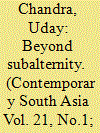

|
|
|
|
|
| Publication |
2013.
|
| Summary/Abstract |
Subalterns, as Ranajit Guha famously argued, resist modern states on the basis of pre-existing social solidarities and an autonomous domain of consciousness. Critics of subaltern studies have argued, however, that subaltern resistance is, in fact, deeply implicated in the symbols and discourses of domination rather than simply constituting an autonomous political domain. Might it be possible to take this criticism of subalternity seriously and yet appreciate the complex ways in which adivasi subjects in contemporary India resist and negotiate their subjecthood? Can we, then, locate resistance in the process of negotiating states? Focusing on the eastern Indian state of Jharkhand, this paper takes up this challenge by probing into the tropes and strategies by which the contradictory mechanisms and meanings of modern state power have been reworked and resisted in two apparently opposed moments of resistance: the 'peaceful' Koel-Karo anti-dam movement of the 1980s and the ongoing 'violent' Maoist movement. In doing so, I show how land and community are intertwined inextricably in recent adivasi resistance such that the notion of 'community' underpins both territorial claims on the post-colonial state by Munda men and women and efforts to remake political selves in dialogue with statist discourses of primitivism.
|
|
|
|
|
|
|
|
|
|
|
|
|
|
|
|
| 2 |
ID:
137259
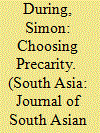

|
|
|
|
|
| Summary/Abstract |
This essay argues that global neo-liberalism has undercut the analytic power of the concept of the ‘subaltern’. It has instead produced a new category: the precariat. It makes this case first by examining Carlo Levi's Christ Stopped at Eboli, which helped define the subaltern, and then by showing that the aftermath of the 1968 revolutions slowly overturned the problematic installed by Levi and the Subaltern Studies group. It ends by offering an account of contemporary precarity via a reading of Amit Chaudhuri's novel, The Immortals.
|
|
|
|
|
|
|
|
|
|
|
|
|
|
|
|
| 3 |
ID:
177679
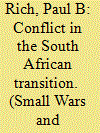

|
|
|
|
|
| Summary/Abstract |
This fairly lengthy book is a recent addition to the extensive literature on what some analysts have termed the ‘armed struggle’ in South Africa, focusing particularly on the later phase of conflict from the mid-1980s through the transition to an ANC-led government in 1994 and continuing sporadically in the years afterward. It is a work that might have some appeal to military and strategic analysts focused on guerrilla war and counter-insurgency, based as it is on some fairly extensive if narrowly focused researched. However, many of its assertions and conclusions can be seriously contested.
|
|
|
|
|
|
|
|
|
|
|
|
|
|
|
|
| 4 |
ID:
137265
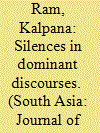

|
|
|
|
|
| Summary/Abstract |
Subaltern Studies continues to be generative for understanding the present, provided we expand our evaluation beyond the question of ‘who is subaltern?'. This paper considers instead underlying methodological orientations that outlive their original empirical context, lending themselves to fresh applications. The original method trained us to notice gaps in governmental discourse, silences that underlie its claims to know and administer all within its domain. Based on ethnographic work in rural south India, the paper argues that despite the radical expansion of governmental discourse, it still does not coincide with the everyday practices people continue to inhabit. These practices shape, for example, rural women's everyday poesis in the stories they tell of injustices they have suffered, and the way these injustices erupt as disorder in the body's relationship to the world. To be able to write about these silences minimally requires, however, a second orientation, also present in early Subaltern Studies. This is the underlying epistemic confidence that it is possible, despite the odds, to understand better the meanings and workings of practices that may no longer constitute coherent or self-sufficient worlds—but which nevertheless continue to enjoy a vital and lively presence for subalterns, and for us all.
|
|
|
|
|
|
|
|
|
|
|
|
|
|
|
|
| 5 |
ID:
163821
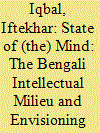

|
|
|
|
|
| Summary/Abstract |
Drawing on a new digital collection of oral interviews, this essay examines the place and meaning of the state in Bengali thought. In the immediate aftermath of decolonisation, East Bengal intellectuals, without substantial pre-engagement with the colonial state, favoured forms of political action or praxis that longed for a new state—a longing that culminated in the birth of Bangladesh in 1971. Intellectuals connected to West Bengal, already entrenched in their own economic and social multiverse, never entertained the idea of a new state outside India. Instead, a Foucauldian irreverence for the state and its elite became more dominant there, flourishing through Subaltern Studies. Despite these differences perceptible synergies in the Banglaphone thoughtscape took root in the 1980s that spoke to late Cold War anxieties about the future of participatory democracy and the public good. This convergence of thought across Bangladesh and West Bengal reflected the emergence of an intellectual who elided the notional boundaries of the post-colonial state, yet stood ambivalently before the crucible of neo-liberal temporality, exposing the limits of the discursive subject in the late twentieth-century Global South.
|
|
|
|
|
|
|
|
|
|
|
|
|
|
|
|
| 6 |
ID:
137257
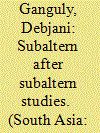

|
|
|
|
|
| Summary/Abstract |
Few scholars of my generation with an interest in South Asian and Post-Colonial Studies have escaped the influence of Subaltern Studies. Many of us chose a research trajectory that fortuitously offered opportunities to work in proximity with members of the Subaltern Studies collective. By the time I began my graduate work on caste and Dalit studies at the Australian National University (ANU) in Canberra in the late 1990s, Ranajit Guha had already stepped down as editor of Subaltern Studies and his celebrated six volumes had become part of global academic lore. Reading these volumes as a fresh college lecturer in Mumbai in the early 1990s played no small part in my decision to undertake my graduate training in Canberra. Guha, after all, was based at ANU as a senior research fellow at the erstwhile Research School of Pacific and Asian Studies (RSPAS). He had moved there in 1980 from the UK and lived in Canberra for the next two decades, in effect conferring on ANU the distinction of being the academic home from which the classic volumes of Subaltern Studies emanated—a fact, perhaps, little known to a new generation of post-colonial scholars globally. Dipesh Chakrabarty, an alumnus of ANU, had already moved to the University of Chicago. But he had a visiting appointment at the Humanities Research Centre that adjoined the Literature Department in ANU's famous A.D. Hope Building. Given my disciplinary base in the literature programme, I soon got to meet them both through formal introductions by the chair of my panel, Jon Mee.
|
|
|
|
|
|
|
|
|
|
|
|
|
|
|
|
| 7 |
ID:
137261
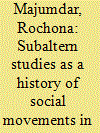

|
|
|
|
|
| Summary/Abstract |
While there is a thriving sociological and historical literature on social movements in post-colonial India, popular mobilisations of the colonial period are rarely addressed in terms of social movements. But the historical record is replete with instances of countless mobilisations seeking change against the state and other forms of authority in colonial society. This essay analyses a select group of works by the historical collective, Subaltern Studies, with the explicit goal of seeing these works as histories of social movements in colonial India. It also argues that one of the lasting legacies of the collective's writings was to present us with a paradigm, not unchallenged, of the revolutionary subject of such movements. By focusing in particular on Ranajit Guha's early writings, I present a reading of the colonial Indian peasant as this paradigmatic rebel subject.
|
|
|
|
|
|
|
|
|
|
|
|
|
|
|
|
| 8 |
ID:
137258
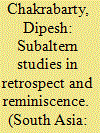

|
|
|
|
|
| Summary/Abstract |
This essay aims to provide a context for the intellectual project of ‘subaltern history’ and the associated series, Subaltern Studies, by undertaking a retrospective description and evaluation of the project and by drawing on the history of Dipesh Chakrabarty's personal involvement in it. It also attempts to outline some of the limitations of the original conception of the project as well as highlight some of its more enduring legacies.
|
|
|
|
|
|
|
|
|
|
|
|
|
|
|
|
|
|
|
|
|